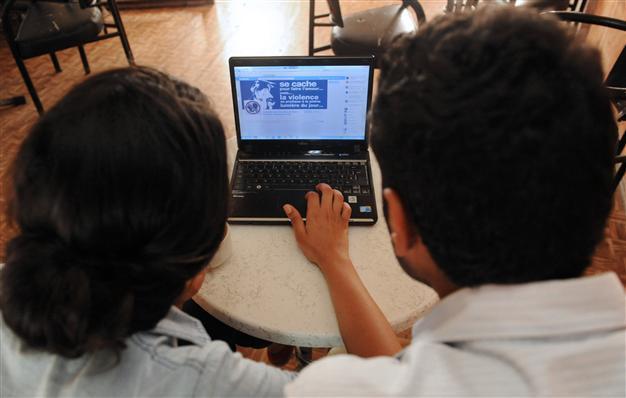Teenage couple's kiss shakes Morocco by Internet effect, triggers calls for kiss-ins
RABAT - Agence France-Presse

A woman and a man look at a Facebook page in Agadir on Oct. 11 published in support of the three Moroccan teenagers arrested for posting Facebook photos of two of them kissing outside their school in the northern town of Nador last week. AFP photo
The trial of three teenagers for posting Facebook photos of two of them kissing has sparked a storm of online protest in Morocco, where conservative religious values are being challenged in cyberspace.
The offending couple, a boy and a girl aged 15 and 14, and their 15-year-old male friend who took the photos outside their school in the northern town of Nador, were arrested last week.
The arrests immediately triggered a wave of online support, with activists posting pictures of couples locking lips and calling for protest "kiss-ins", and the judge ordered that the teens be released on bail three days later, ahead of their trial on Oct. 11.
"Social media are playing a more and more important role in monitoring both the authorities and Moroccan society, which remains deeply conservative," said political analyst Mohammed Madani.
"Activists agitating on Facebook are a potent force because they can get media attention, sometimes abroad, and can shake the conservative values both of society and the state," he added.
"As a result, the authorities review judicial decisions and sometimes challenge them, as happened in the case of the Spanish paedophile" mistakenly freed in July by King Mohamed VI.
Faced with public outrage at the decision to free convicted child rapist Daniel Galvan, along with dozens of other Spanish nationals jailed in Morocco, the royal pardon was hastily revoked, with the palace insisting the king had been unaware of the nature of Galvan's crimes.
Underlining the growing power of social media, U.S. NGO Freedom House said last week that 55 percent of the Moroccan population regularly accessed the Internet in 2012, the highest penetration rate in Africa, up from 21 percent in 2007.
On the eve of Friday's trial, hundreds of Moroccan online activists renewed their demands that the charges against the three teenagers, of "violating public decency", be dropped. In the event, the trial began and was quickly adjourned until November 22 to allow "an inquiry into the social circumstances of the teenagers", their lawyer Monaim Fettahi said.
More than two thousand people have indicated that they will attend a planned "giant kiss-in" outside parliament in Rabat on Oct. 12.
'Upset people's feelings'The accused were arrested after a Moroccan NGO filed a lawsuit late last month charging that the published photos of them kissing outside their school had a negative affect on society, "and upset people's feelings."
The teens are being tried under Articles 483 and 484 of the kingdom's penal code, which relate to public indecency and indecent assault on a minor, the later carrying a possible prison sentence of five years.
Morocco has a reputation for religious tolerance and personal liberty, particularly when compared with other Muslim countries.
Women enjoy relatively extensive freedoms and there are plenty of bars in the main cities. But it still remains a deeply religious society.
Human rights campaigners in Morocco, for the most part secular-minded young people who are active online, say society is torn between religious conservatism and the growing importance of Internet communication.
"Weighed down by religion and social taboos, Moroccan society seems to be lost and divided. It has struggled to embrace a modern world characterised by the Internet and global communication," said activist Ibtissam Lachgar.
"It's always the question of personal freedom that is at the heart of this. It's like Moroccan society has been shaken by the Internet effect," added Lachgar, a co-founder of the Alternative Movement for Individual Liberties.
The Moroccan campaign group caused a stir in 2009 when members began boycotting the day-long fast throughout the Muslim holy month of Ramadan, and were arrested for staging a picnic outside a railway station in Rabat. They have since called for the scrapping of a law criminalising Muslims for publicly flouting the Ramadan fast. But the legislation remains in force.
